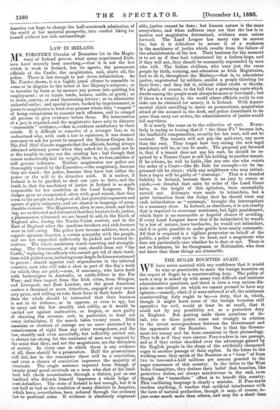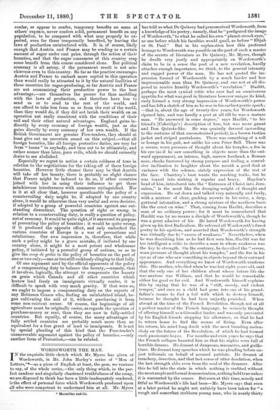THE SUGAR BOUNTIES AGAIN.
WE have never asserted with any confidence that it would be wise or practicable to meet the foreign bounties on the export of Sugar by a countervailing duty. The policy of such a step is mixed up with many very difficult and intricate administrative questions, and there is even a very serious dis- pute on one subject on which we cannot pretend to have any opinion,—namely, what, if it were enforced at all, the minimum countervailing duty ought to be,—a duty, that is, which, though it might leave some of the foreign bounties still operative for evil, would at least be so small, that it could not by any possibility act as a protective duty in England. But putting aside these questions of de- tail, two or three points come out strongly in relation to the recent correspondence between the Government and the opponents of the Bounties. One is that the Govern- ment are uneasy and far from consistent in their phraseology. They talk as if they were sincere Free-traders in one passage, and as if they rather chuckled over the advantage gained by the English people in the shape of the artificially cheapened sugar in another passage of their replies. In the letter to the working-men, they speak of the Bounties as a " boon " of from two to two-and-a-half millions per annum granted to the sugar consumers of this country. In the letter to the West India Committee, they declare their belief that bounties, like protective duties, are always mischievous in the end, even though the " immediate " effect is to benefit this country. This vacillating language is clearly a mistake. If Free-trade teaches anything, it teaches that artificial interference with the laws of natural production, though it may, of course, in- jure some much more than others, and may for a short time
confat, or appear to confer, temporary benefits on some at others' exren3e, never confers solid, permanent benefit on any population, to be compared with what may properly be ex- pected, even for those temporarily benefited, by leaving the laws of production uninterfered with. It is, of course, likely enough that Austria and France may be sending us a certain amount of sugar under cost price, through the action of their bounties, and that the sugar consumers of this country reap some benefit from this course considered alone. But political economy is all astray, if the permanent result is not mis- chievous even to this country. So far as the practice encourages Austria and France to embark more capital in this operation than would really be attracted to it by the natural facilities of these countries for sugar-producing, so far Austria and France are not economising their productive power to the best advantage,—are themselves the poorer for thus meddling with the laws of production, and therefore have less to send us or to send to the rest of the world, and can afford to take less from us or from the rest of the world, than they would do, if they did not lavish their wealth on an operation not really consistent with the conditions of their soil and their other natural advantages. England gains in- directly by every economy of foreign wealth, just as she gains directly by every economy of her own wealth. If the British Government are genuine Free-traders, they should at least give out no uncertain sound on this subject,—that all foreign bounties, like all foreign protective duties, are very far from " boons " to anybody, and turn out to be ultimately, and rather sooner than later, pure evils, which we should earnestly desire to see abolished.
Especially we regret to notice a certain coldness of tone in relation to the negotiations for the taking-off of these foreign bounties. However little chance there may be that Austria will take off her bounty, there is probably no slight chance that France might be induced to do so, if other countries joined with her in using their influence to get these mischievous interferences with commerce extinguished. Nor is it at all clear that, however questionable the policy of a countervailing duty might be, if adopted by one country alone, it would be otherwise than very useful and even decisive, if adopted by a group of powerful countries against one out- standing dissentient. The question of right or wrong, in relation to a countervailing duty, is really a question of policy, not of economy. It would be quite right, if it answered its purpose of preventing the policy of bounties ; it would be quite wrong, if it produced the opposite effect, and only embarked the various countries of Europe in a war of precautions and retaliations. Our own impression is, therefore, that while such a policy might be a grave mistake, if initiated by one country alone, it might be a most potent and wholesome policy, if initiated by a powerful group of nations, so as to give the coup de grcice to the policy of bounties on the part of one or two only,—one or two still recklessly clinging to that folly. Of one argument used by the official opponents of the policy of a compensating duty to balance the bounty,—namely, that it involves, logically, the attempt to compensate the bounty on grain which Canada and all other countries which bestow land freely on immigrants virtually confer, it is difficult to speak with very much gravity. If that were so, we ought to impose a compensating duty on the exports of any Robinson Crusoe who, finding an uninhabited island, be- gan cultivating the soil of it, without purchasing it from some non-existent owner. Of course, the beginnings of all agriculture must be originally easier, as regards the question of purchase-money or rent, than they are now in fully-settled countries. But equally, of course, the many advantages of fully settled countries are probably much more than an equivalent for a free grant of land to immigrants. It is not by special pleading of this kind that the Free-trader's unanswerable argument against the policy of bounties,—only another form of Protection,—can be refuted.







































 Previous page
Previous page